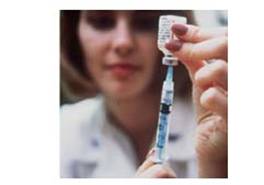|
|
After Meeting, F.D.A. Official Is Pessimistic on Winter Flu Vaccine
By Andrew Pollack
October 9, 2004, New York Times

The
F.D.A. inspectors were hurriedly sent to Britain this week to explore the problems with sterile manufacturing that led the British to suspend the license of the vaccine factory in Liverpool. This weekend, the team will conduct its own inspection of the factory, owned by Chiron of Emeryville, Calif.
One goal of the visit is to see whether some of the vaccine can be made available to be used. But the comments by the acting commissioner, Dr. Lester M. Crawford, dampened those hopes. He and other American officials spoke at a hearing of the House Committee on Government Reform. A spokesman for the agency said Dr. Crawford's comments reflected "a practical assessment of where things stood rather than a judgment of the status of the vaccine."
Chiron reported finding bacterial contamination of some lots late in August, but told American officials as recently as last week that it had isolated and corrected the problem and that it would start shipping vaccine in early October.
Representative Henry A. Waxman of California, ranking Democrat on the House Government Reform Committee, said in an interview that the drug agency had "relied on the company too much" for information rather than thoroughly inspecting the factory after the contamination was known. The agency, he added, "appears to be playing catch-up in learning about potential problems at a plant that supplies half the nation's flu vaccine."
Two officials of the Food and Drug Administration said in an interview yesterday that its inspectors visited the plant in late August because they were coincidentally at nearby building when the contamination was found. The officials said the agency was expecting a final report from Chiron this week and might act after receiving it. Instead, the British government received the report last week and inspected earlier.
"We were operating on the same tracks," one of the two officials, John M. Taylor, an associate commissioner for regulatory affairs, said.
The agency conducted a big inspection last year at the Liverpool factory and found "systemic issues" similar to what the British found last week, according to Mr. Taylor and to Dr. Karen Midthun, a deputy director of the division that oversees vaccines.
The agency did not suspend the plant's license because the errors were corrected or there was a plan to correct them, the officials said. While bacterial contamination was found in early stages of manufacturing, before the sterilization process, the two officials said, none was found in finished product.
Members of the House panel and witnesses discussed whether making drugs abroad jeopardized public health in the United States.
Representative Tom Davis, the Virginia Republican who is chairman of the Government Reform Committee, said in an interview that "if it was a bad year, Britain would have first call" on flu vaccine from Liverpool.
|
|



